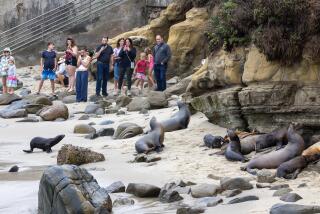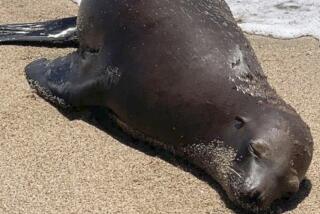Sea Lion Keeps Navy on the Run : Military: Animal activists rally to Pumpkin’s plight and criticize use of marine mammals for tests.
Pumpkin the Navy sea lion remained free in waters off Santa Cruz Island Wednesday, eluding the efforts of his Navy keepers to recapture him.
The 16-year-old California sea lion went AWOL a week ago from a routine Navy training exercise clearing dummy mines in the Channel Islands.
On Wednesday, animal activists rallied to Pumpkin’s plight and criticized the Navy’s use of marine mammals.
“Good for him,” said Ingrid Newkirk, chairperson for the Washington-based People for the Ethical Treatment of Animals, praising Pumpkin’s dash for freedom.
“The Navy declared war on marine mammals a long time ago. It’s too bad the Geneva Convention doesn’t extend to sea lions.”
Following a weeklong search by air and sea, Pumpkin was briefly captured Tuesday on Gull Island, a rocky outcrop off the southern coast of Santa Cruz Island.
But the sea lion, which had apparently been injured, wrestled free from his captors and plunged back into the sea while they waited for a helicopter.
A harness that the sea lion wore to recover dummy explosives fell off, leaving Navy frogmen no way to distinguish Pumpkin from the thousands of other sea lions in the area.
“The fact is he’s out there on his own, and he may want to stay out there,” Navy spokesman Tom LaPuzza said.
LaPuzza said Navy personnel remain in the area and are trying to coax him back to the boat with an audible beacon and buckets of fish.
“Without identifying marks, the only way they’ll recognize Pumpkin is if he jumps in the boat,” LaPuzza said.
Pumpkin’s disappearing act surprised Sam Ridgeway, the Navy’s senior veterinary officer who started the Marine Mammal Program at the Point Mugu Lagoon in 1959.
“We’ve had Pumpkin for 15 years,” Ridgeway said. “He’s been a good, steady worker. But who knows what goes through the mind of a sea lion.”
He said Pumpkin, a neutered male that turned 16 on Saturday, had been trained in the open ocean at least 2,000 to 3,000 times over the years. Ridgeway said sea lions are more closely related to dogs and bears than to dolphins, and are as easily trained as dogs.
Local activists cited Pumpkin’s dash for freedom as an example of improper use of sea mammals for military experimentation.
Simon Oswitch, vice president of Animal Emancipation Inc., called the practice cruel and increasingly unnecessary.
“I’d like to know what they do with the animals that don’t make the training cut,” Oswitch said.
Some animal activists have long criticized the Navy’s Marine Mammal Program, which includes 125 dolphins, sea lions and other sea mammals trained to recover training mines and intercept enemy frogmen.
In 1989, several former Navy trainers accused the Navy of employing brutal methods in training the mammals, but an investigation by the federal Marine Mammal Commission cleared the Navy of extensive wrongdoing.
Peter Howorth, the director of the Marine Mammal Center in Santa Barbara, said Pumpkin’s chances of survival are excellent, despite his naval training to avoid foraging.
“Even captive-born sea lions are only one or two generations removed from millions of years of evolution,” Howorth said. “They are highly intelligent and highly sociable, and the odds are extremely good that his instincts would take over. It’s not like releasing a toy poodle into the National Forest.”
LaPuzza said other sea lions have wandered off during exercises in the Channel Islands, and some swam directly back to their pens in San Diego.
But not all return, he said.
Several teams of Navy animal trainers will remain in the area through today before calling off their search.
More to Read
Sign up for Essential California
The most important California stories and recommendations in your inbox every morning.
You may occasionally receive promotional content from the Los Angeles Times.










